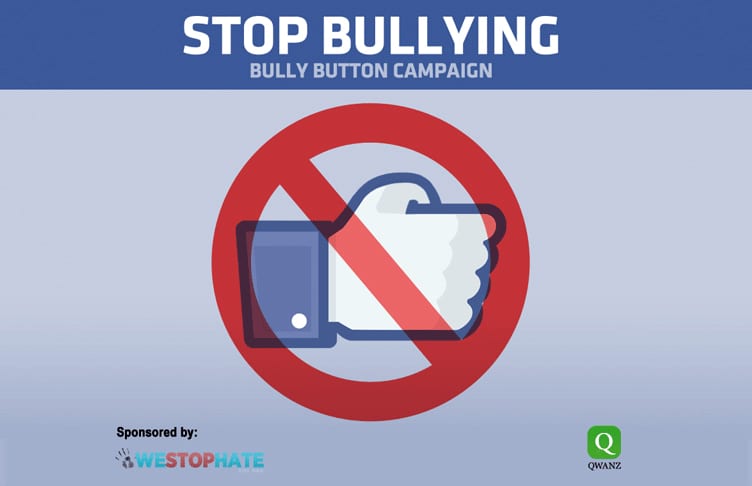 Can you recall a time when you were bullied as a kid? I can. I clearly remember what it is like to be teased, shunned and physically overwhelmed by someone bigger and stronger than myself. It felt awful.
Can you recall a time when you were bullied as a kid? I can. I clearly remember what it is like to be teased, shunned and physically overwhelmed by someone bigger and stronger than myself. It felt awful.
Even now, 24 years later, I can still remember the shame, pain and embarrassment of it all. I cannot imagine growing up in today’s world with technology and social media around every corner. “Cyber bullying” is not just a buzz word rampant in today’s social stratosphere, it is a living nightmare for so many vulnerable kids day after day.
The Internet empowers bullies to speak more cruelly, threaten more harshly and gain more momentum than ever before because their actions have little to no repercussions. As a parent, it is easy to feel overwhelmed and helpless in regards to cyber bullying.
This week I had the absolute honor to interview Emily-Anne Rigal, whom Lady Gaga calls a young woman with, “strong convictions and a beautiful soul.” At only eighteen years old, this college freshman has already founded and is running a grass roots movement called WeStopHate. The mission of the organization is to raise “self-esteem in teens through various social media platforms that engage teens to help each other gain confidence.” They also stress that “WeStopHate is more than just an anti-bullying program, it’s a call-to-action to stop hate: stop hating on yourself, stop hating on others, stop letting others hate on you.” It is a program started by teens and run by teens.
Emily-Anne was bullied so much as a young girl, because of her weight, that she was forced to switch schools to escape her tormentors. Deciding she could transform her pain into something beautiful to help others, she started WeStopHate. Her movement has since gained national attention from the media and celebrities alike.
What is most meaningful to Emily-Anne? The stories she hears from her fellow peers who have joined this movement. When teens go on her site and connect with other teens who are being bullied or feeling ostracized, they don’t feel as alone anymore. They feel connected and empowered. Emily-Anne has even gotten letters from participants that have stated her website saved their lives. Emily-Anne admits how overwhelming that thought is to her. Those letters keep her motivated while working late into the night, as she juggles her full-time work for WeStopHate with being a college freshman at the prestigious Columbia University.
I asked Emily-Anne, as a parent, what could I do to help my child who is being bullied? Emily-Anne gave me some great tips:
1. Know that if your child mentions that he is being bullied in any way, you can assume the situation is much worse than then he lets on, so take it seriously. There is so much shame and embarrassment tied to being bullied. Often a child will feel that is it is a major failure or wrong-doing on his own part. Often, he will downplay the bullying and try to minimize it.
2. The best time to get information about what is actually happening to your child is in a one-on-one setting. Bringing up the situation during a family dinner or in a group setting is not the ideal way to approach your child. Try to find a quiet moment with just the two of you in order to gently investigate the situation.
3. When you do find out the details of the bullying, go directly to your child’s school administration and fight as hard as you can for your child, even if it is cyber bullying. The administration may not want to get involved, but it is important to take the issue as far as you can. Often parents feel that a solution to cyber bullying is simply taking away the child’s computer or phone. The problem at hand is much more pervasive and cannot be remedied that easily.
According to www.dosomething.org, over 58% of kids report that someone has said something hurtful or mean to them online. Many teen suicides have been linked to cyber bullying. It is reported that bullying victims are 2 to 9 times more likely to consider committing suicide.
These statistics were far too much for Emily-Anne to accept. She decided to campaign for Facebook to add a “Bully” button to its site. This button would allow others to report the actions of cyber bullies, in order to subject them to an investigation, which could lead to their Facebook account being temporarily suspended. (If you think Facebook should have a Bully Button to protect your kids against bullies, check out this link to join your voice with Emily-Anne’s and be heard)
I asked Emily-Anne if any of the kids who bullied her reached out to her after she started her organization. Thoughtfully, she told me they hadn’t; but that she feels her “painful memories serve a purpose” and that “she doesn’t resent them because the past is the past.” Emily-Anne received a TeenNick HALO Award in 2011. I am contemplating framing her acceptance speech and hanging it in my daughter’s room.
Here is what she said to the audience of teens cheering her that night: “Speak your truth, even when your voice shakes. Always be who you are. Spend time with the people who make you happy and not the people you have to impress. And please know that making a difference means doing what you can, with what you have, where you are.”
Can we say future Nobel Peace Prize Winner? I think so!





